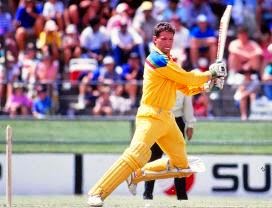JUST A RUN
AGAIN BETWEEN TWO OLD CHAMPIONS
Australia v India • Woolloongabba,
Brisbane,
1 March 1992
1 March 1992
The winners of the last two World Cups did not
begin the present tournament on a happy note. Australia, who started as one of
the fancied teams, were beaten by New Zealand and South Africa to the dismay of
the home crowds. India lost narrowly to England, and a supposedly easy match
against Sri Lanka was washed out.
Both teams were, therefore, eager to register a
win at the Gabba. The Australians elected to bat. But they were jolted by Kapil
Dev as he removed both openers Geoff Marsh and Mark Taylor with just 31 on the
board. David Boon and Dean Jones settled down to a fine partnership. They added
71 for the third wicket. Jones hit a typical 90 off 108 balls, characterised by
hard running and flashing shots. He crashed 6 fours and 2 sixes. He explained
his approach: "I try to come across as a player who enjoys the game and
has a good time. The kids who see that will want to play the game as well. If
you are full-on aggressive it gets through to people." Steve Waugh and Tom
Moody also made valuable contributions. Then the Indian medium-pacers led by
Manoj Prabhakar got into the swing of things. From 230 for five, Australia
slumped to 237 for nine at the end of their 50 overs.
It was then that a flawed rule regarding
interruption of play by rain began to cast a shadow over the tournament. As the
weather gods intervened, three overs were lopped off the Indian innings, but
the target score was reduced by only two runs. The reasoning behind this absurd
rule was that while deducting the number of overs, the ones to be taken into
account were those in which the team batting first had scored the least number
of runs. So going through the scoring pattern of the Aussies it was found that
in the three overs that they had scored the least, a sum total of two runs had
accrued. This rule was to provoke much derisive laughter and anguish later in
the tournament. Conventional logic, taking average scoring-rate into consideration,
would have reduced India’s target to 224. But now India's target was 236 off 47
overs.
India made a dismal start as Krish Srikkanth was
bowled for a duck. But skipper Mohammad Azharuddin was in prime form. On either
side of the rain break, he was helped by Ravi Shastri and Sachin Tendulkar in
rebuilding the innings. Kapil Dev, promoted up the order, scored a quick-fire
21. Then Sanjay Manjrekar joined his captain, and the two put on 66 for the
fifth wicket.
Azharuddin was run out for a brilliant 93 off
103 balls with ten boundaries. Then the Indian innings began to come unstuck.
Ajay Jadeja went for one, and Manjrekar too was run out for 47 off 42 balls
with 3 fours and a six. India needed 13 off the final over with three wickets
in hand. Strangely, the 6 feet 8 inches non-regular bowler Tom Moody sent down
the pulsating last over. Kiran More flicked the first two balls to square-leg
for fours. Now five runs were required off four deliveries. More got carried
away, missed, and his middle stump broke into two. A single was scampered off
the fourth ball. But Prabhakar was run out off the fifth.
Four runs were needed off the last ball. Javagal
Srinath swung hard and high but straight to Steve Waugh who dropped the catch.
But he recovered quickly and threw the ball back. Venkatapathy Raju was going
for the run that would have tied the scores. The throw beat him and Australia
won a dramatic match by one run. For the second time in the World Cup,
Australia pipped India by this razor-thin margin.
Australia : 237 for 9 wickets (50 overs)
India : 234 all out (47 overs)
(Author Indra Vikram Singh can be contacted
on email singh_iv@hotmail.com).
The
Big Book of World Cup Cricket 1975-2011
ISBN
978-81-901668-4-3
Distributed
in India by Variety Book Depot, Connaught Place, New Delhi, Phones + 91 11
23417175, 23412567
Available
in leading bookshops, and online on several websites.



No comments:
Post a Comment